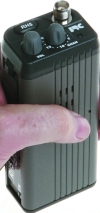

The guarding industry is huge. With the current crime situation in southern Africa, it promises to become arguably one of the biggest growth industries that this country has seen in the past two decades.
But can the current state of guarding practice meet the rapidly growing need to safeguard assets? There is general acknowledgement that the current modus operandi has many shortfalls.
Foremost of these is the human element - no matter how sophisticated the system, it can be nullified by the officer who goes to sleep while on duty, or who takes shortcuts on the designated patrol route.
Equally bad is the practice of leaving officers at their duty point without any means of communicating with their base station.
And, possibly the worst practice in an industry that should be based on the principle of pro-activeness, is the fact that most guarding audits appear to take place after the fact.
It is an indictment of the industry that there are so many shortfalls in guarding management. Much of this may be attributed to the fact that systems design has not kept up with the demands of guarding practice. The result is guarding management that concentrates on the logistics of duty rosters and staff scheduling, but neglects aspects of supervision and communication that are crucial for productivity and effectiveness.
With crime against both residential and industrial properties reaching epidemic proportions, the time has come to review current practice and to look beyond the techniques that have been employed in the past.
It is a well-known fact that constant supervision of guards on duty is necessary to ensure that they perform their duties diligently. To date this has been done by the human supervisor, which makes it time-consuming and costly.
According to Louis Ashpole of IRC, "Developments in systems design now mean that two-way radio communication is the most cost-effective and efficient medium for monitoring and remaining in constant communication with the guard on duty.
"If we were serious about safeguarding our customers and their assets, we would not think twice about equipping each and every member of a guard force with a two-way radio communication and monitoring system.
"With such a system in place, automatic, invisible, realtime monitoring becomes a reality: keeping track of guards' movements, and signalling the base station that the guards are performing as required - not cutting those corners or taking an unauthorised nap.
"In short, guarding management will rely on systems that integrate realtime guard monitoring and panic systems through two-way radio communication. And the future of manned guarding will begin when every guard is equipped with a two way radio capable of withstanding the harsh conditions within which they operate."
For more information contact Louis Ashpole, IRC, 011 465 8098, [email protected], www.ircradio.co.za

© Technews Publishing (Pty) Ltd. | All Rights Reserved.